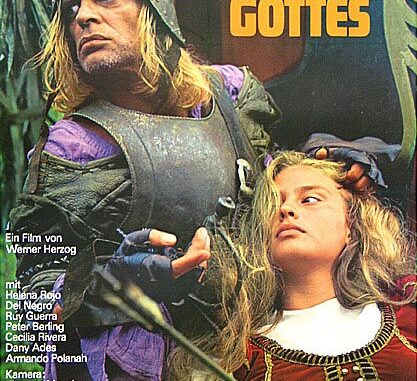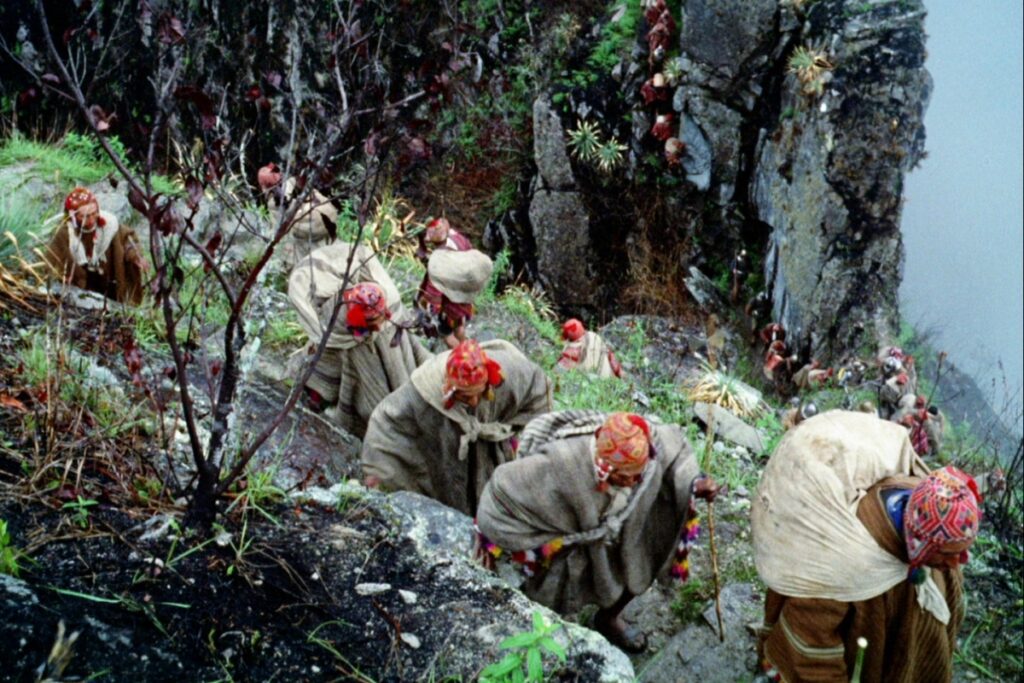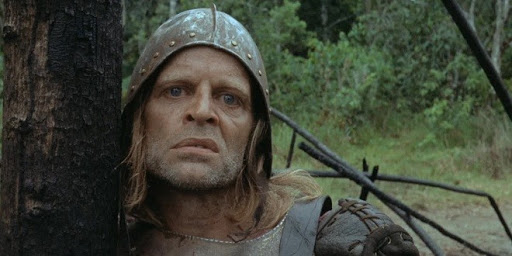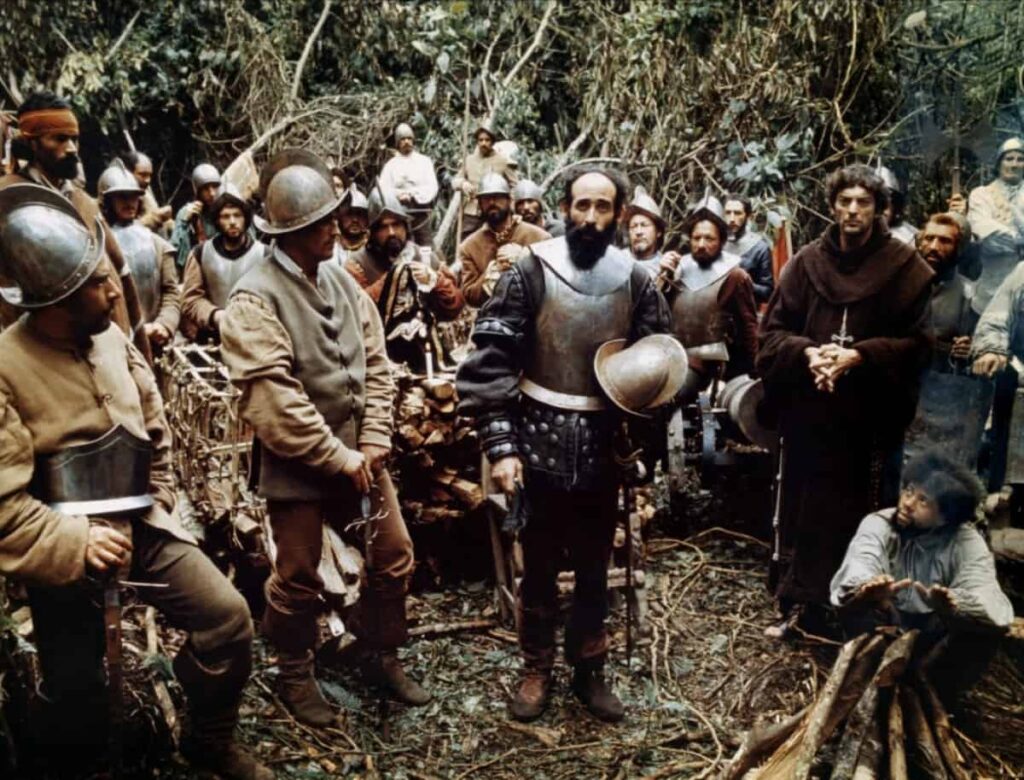
I think the best movies are the ones that make you ask questions. They can be really straightforward questions, like “What is good and evil?” or “What’s the meaning of life?” Some movies however, ask more specific questions, and are a bit more open ended and tough to answer. Like, “What are the qualities of an insane person, or group? Are they born insane or are they predisposed to that condition?” or “In an unfamiliar land, if your society’s rules and customs fail you, were they any good in the first place?” The movie that asks these troubling questions is the 1972 German epic, Aguirre, the Wrath of God, directed by Wener Herzong and featuring Klaus Kinski in the title role.
The film tells the story of a group of Spanish conquistadors traversing the Amazon jungle after conquering the Incas. A group of these conquistadors break off from the main group in hopes of finding the mythic city of gold, El Dorado. The men, in their hubris, reject the Spanish monarchy and start their own empire, journey deeper into the jungle, slaughter every native on sight, and die a slow, painful death at the hands of said natives and the jungle itself.

Before going into the thematic weight and powerful performances of the film, there are few crucial aspects of it that make it a very special work of art. Firstly, is its structure and length. For such a grand adventure, it runs at a lean 90 minutes. I feel like a lot of epic films have a major barrier of entry through their runtime.
Think Lawrence of Arabia or Apocalypse Now. Both movies nearly run or are over three hours long. This isn’t a slight against them, but in the hustle and bustle of modern life, it can be difficult to find time or be in the mood for a three-hour movie. Aguirre circumvents that. It runs for 90 minutes and has a very clear three act structure despite the esoteric plot and lack of exposition.
Next is the cinematography. Aguirre is one of the most gorgeous films ever shot, with breathtaking shots of the South American landscape in all its glory. The film is completely shot on location, with the cast and crew having to haul all their props through the terrain. The film opens on an army of conquistadors and the natives they enslaved traversing down the Andes mountains. The mountain’s mist swirls, the chilling winds cut right through you, and the men are swallowed whole by the rocky peaks.
When we finally get to the Amazon, we follow the men as if we were a documentary film crew. We’re not just viewing the action, we’re in the thick of it. We catch every emotion that runs through a conquistador’s head. We catch every death that they inflict and is inflicted unto them, every bit of flora and fauna that they pass by or dominate. It’s a novel way of shooting a feature-film, and I can only thank Herzog for his peerless direction, and Thomas Mauch’s boundless talent.
Finally, the soundtrack by German krautrock band Popol Vuh. It’s fairly limited, composed of two songs that total for a 13 minute runtime, but it’s extremely effective. Haunting Moog synths and ghostly choirs transform the Amazon into a living, breathing organism that has a penchant for killing violent invaders and protecting its people. It’s remarkable what a little bit of music can add to a picture.
Onto the performances. It’s one of those rare films that are not only perfectly cast, but perfectly performed as well. Every actor in the movie becomes their character, and inject so much life into them despite the esoteric plot. From the piggish nobleman Fernando de Guzzman (Peter Berling), to the opportunistic priest Gaspar de Carvajal (Del Negro), the morally upright nobel, Pedro de Ursúa (Ruy Guerra) and his mistress Inés (Helena Rojo), everyone has an identifiable and memorable character.

Of course, how can we forget about Kinski as Lope de Aguirre? Kinski is an actor that I always feel conflicted talking about. On the one hand, he is a complete monster. A clinically diagnosed psychopath, Kinski terrorized the cast and crew with his violent outbursts and ravings, and it later came out that he abused his children in the most horrific of ways. Yet, Kinski is a brilliant performer and commands the screen every time he appears. His frigid gazes, his chilling monologues, his cocky swagger. When I watch Aguirre’s madness, it feels like it’s real, because for Kinski, it is real.
Finally, the movie is a dark satire, both of colonialism, Western society and the very definition of sanity. Throughout the movie, Herzog is making a mockery of how Aguirre’s group is proceeding through the jungle, without ever saying it outright. Instead, like a true documentarian, he lets the subjects themselves expose their true nature, for better (or in this case) for the worse.
One of my favorite scenes is when Aguirre stages an uprising against Ursúa, his superior, as Aguirre insists that they go deeper into the Amazon to find El Dorado. Aguirre elects Guzzman to become their new emperor, and places himself as second in command. Ursúa is then put on trial for treason against the new government, and is found guilty based on the fact he paid a few servants.
It’s an incredibly baffling scene. The man who was loyal to the Spanish government is guilty of treason? He gave some money to his servants as financial compensation for their troubles in the Amazon, but his generosity is a sign that he’s a cold-blooded conspirator? It’s a big farce, and we can laugh at these men for their ridiculous proceedings. But in our modern world, when haven’t those in power imposed their will on the powerless by accusing them of a fabricated crime? How often have courts sided with the powerful in instances like these?

Sanity is also called into question in this film. I think Herzog was trying to find a definition for madness. A common definition of insanity is “doing the same thing over and over again and expecting different results.” Here, I think Herzog is defining it as “doing something that is clearly a folly, but going ahead with it anyway.” It is obvious that El Dorado is a pipe dream, and Ursúa attempts to veer the men back to the larger group, yet Aguirre stages a revolt despite it clearly meaning death. It makes watching the movie incredibly disconcerting, because you know the men are going to die, but no one has the clarity to say “this is madness, we must go back…” Or, they simply know the danger of crossing Aguirre.
In short, Aguirre, the Wrath of God is one of the most immersive film experiences I’ve had in a long time. Even though I was watching it from a laptop, I was thoroughly engaged with the picture and was gripped every minute. I highly recommend watching the English version of the move, as that is in fact the original audio; English was the only common language between the principal cast. The German dub is fine, I’m sure. But no doubt some nuances are lost in translation, and Kinski didn’t even dub his own character. Completely in character, he demanded an exorbitant amount of money for just recording lines at a studio.
